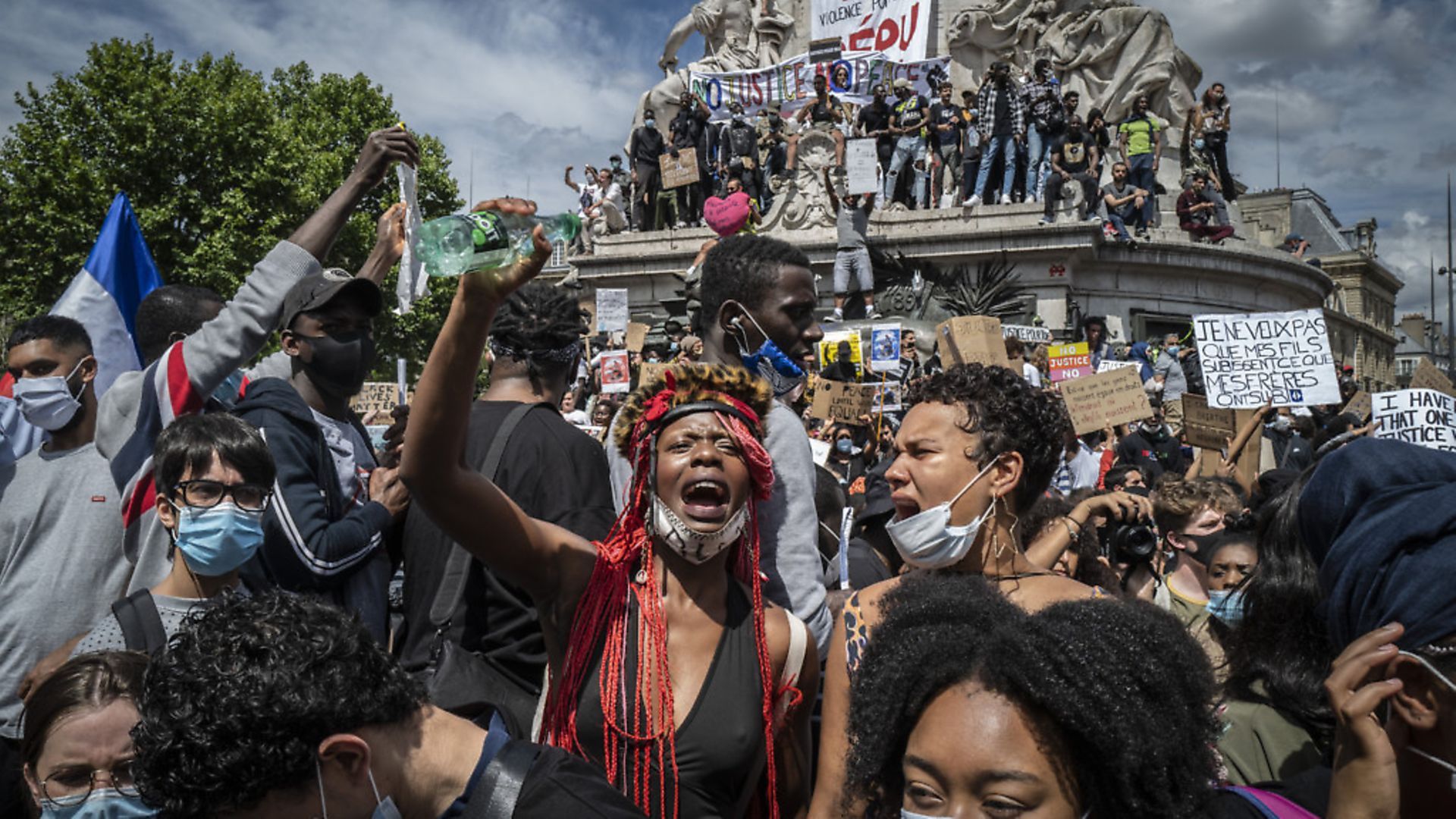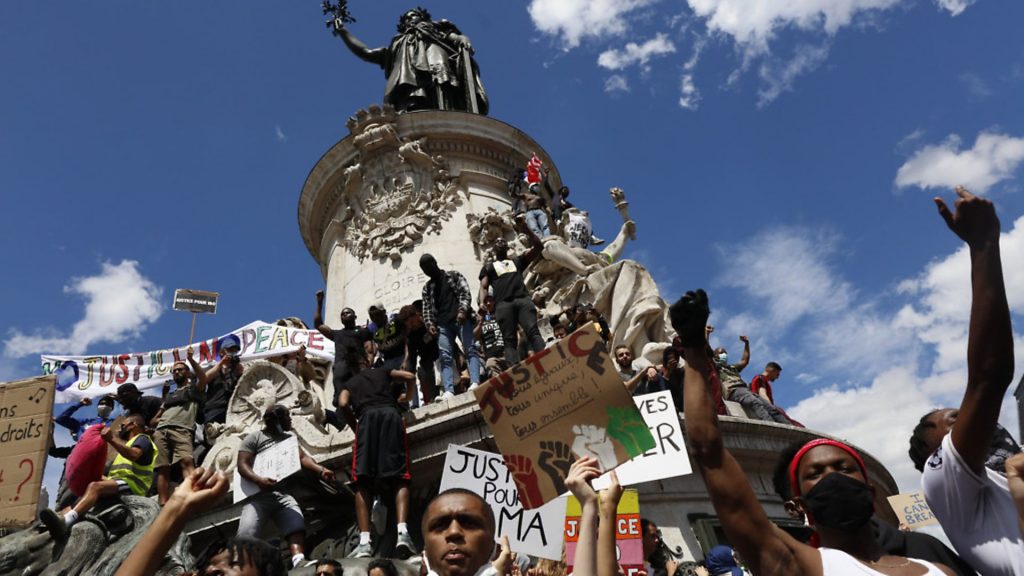
Britain is far from the only country hit by the shockwaves from the killing of George Floyd. JASON WALSH reports on how protests have raised different questions for each European nation

The police killing of George Floyd echoed around the world, but the tide of iconoclasm that ebbed into Britain with the toppling of statues is only one form of the burgeoning protests. Across Europe, American events have catalysed often agonising examinations of past and present alike.
As thousands rallied across Germany in support of Black Lives Matter – inevitably the coronavirus loomed with police breaking up one Hamburg demonstration on the grounds of violating social distancing measures – the debate soon moved on to Germany itself, and whether the country has become more racist and if the concept of ‘Germanness’ extends only to white people.
The country, of course, is forced to deal with the twin agonies of its Nazi past and of East Germany. As a result Germans are more sensitive than most and, unsurprisingly, Germany has no Nazi statues to topple. Central and eastern Europe more generally long ago dealt with unwanted iconography by removing statues. In some cases, notably Budapest’s Memento Park and Lithuania’s Grutas Park, authorities created sculpture gardens, like eldritch Stalinist theme parks.
But iconography comes in forms other than marble and bronze. Take the Netherlands’ longstanding, and long controversial, Christmas tradition of Zwarte Piet (Black Pete), a companion of Saint Nicholas and staple at the country’s festive parades. The dress-up causes a scandal annually. Critics call it a racist blackface caricature, while defenders claim the character’s dark skin is incidental. Christmas came early this year when PM Mark Rutte, formerly a defender, changed his position earlier this month, amid anti-racism protests in the country. In a few years there ‘will be no Zwarte Piets any more’, Rutte said.
Neighbouring Belgium’s troubled symbols, though, are undeniably material: statues of King Léopold II.
Léopold famously held the territory of what is now the Democratic Republic of Congo as a personal possession, supposedly on charitable grounds. In reality it was one of the most brutal of colonial regimes – made infamous in the writings of the outraged Roger Casement, an Anglo-Irish diplomat-cum-revolutionary, and Joseph Conrad’s Heart of Darkness – where his rule killed as many as 10 million Africans.
With one statue of the monarch in Antwerp already removed and at least 17 others defaced, authorities now propose a range of measures, from adding contextualising plaques to removal.
The battle lines being drawn in the country are predictable: the right-wing Vlaams Belang party (‘Flemish Interest’) defends the monuments, with Wouter Vermeersch telling Euronews: ‘We are not people who want to tear down statues, change street names, or erase cultural heritage’. Green politician Tine Heyse differed, saying a decision would not be rushed ‘based on current events [but] it’s clear we’re opting for decolonisation’. Interestingly, Léopold was a Francophone, so representing the other side of Belgium’s contemporary fracture to the separatists of Vlaams Belang.
Have your say
Send your letters for publication to The New European by emailing letters@theneweuropean.co.uk and pick up an edition each Thursday for more comment and analysis. Find your nearest stockist here or subscribe to a print or digital edition for just £13. You can also join our readers' Facebook group to keep the discussion and debate going with thousands of fellow pro-Europeans.
Another former colonial power finds itself in a contradictory position. The home of modern republicanism, France’s guiding principle has long been the 1789 Declaration of the Rights of the Man. But reality and rhetoric have not always matched.
Testament to this is the sad history of Haiti. Inspired by the universalism of the French Revolution, Haitian slaves declared themselves free, rising up in what CLR James’s book The Black Jacobins called history’s only successful slave revolt. But the defeated French demanded reparations for slaveholders, crippling Haiti’s economy.
Colonies from Algeria to Vietnam exposed similar contradictions: how can a France guided by the light of liberty and equality justify controlling other peoples?
There is now a campaign under way to remove a statue of Jean-Baptiste Colbert from outside the National Assembly, France’s parliament. Colbert wrote the 1685 ‘Black Code’. While slavery was outlawed in France, it continued in some colonies – and Colbert’s code governed it.
As yet, statues are not under sustained attack. At least not in the ‘Hexagon’ of mainland France; two depicting abolitionist Victor Schoelcher have been smashed in the overseas territory of Martinique. Demonstrators issued a statement saying ‘Schoelcher is not our saviour’, while president Emmanuel Macron condemned the acts, saying: ‘By abolishing slavery 172 years ago, Victor Schoelcher made France great’.
For the most part the focus is contemporary: police and protestors clashed in cities across France on Sunday at demonstrations accusing officers of systemic racism. Floyd’s killing in Minneapolis has refocused attention on the death of 24-year-old Adama Traoré, who died after being restrained by police in 2016, and recent protests have honoured both men.
Last week interior minister Christophe Castaner said some police had ‘failed in their republican duty’, and banned chokeholds. Police responded by protesting: throwing handcuffs to the ground and complaining accusations of racism were unfounded. Speaking to the nation on Sunday, Macron asked the public to show more faith in the police, but use of force is a perennial flashpoint. December’s strikes saw violent confrontations between officers and strikers and the handling of the gilets jaunes was far from gentle.
Still, Macron addressed the issue directly: ‘I say to you very clearly tonight, dear compatriots, the Republic will not erase any trace nor name from its history. It will not forget any of its works. It will not unbolt a statue.’
But, in what at times seems a reversal of respective national characters of France and Britain – where the debate being raised risks calcifying on the merits of Winston Churchill – French battle lines today are drawn more in the realm of the practical than the symbolic.
Or perhaps it’s simply because statues, while far from uncommon, are not the only method of memorial. France has never been averse to naming and re-naming streets, something paid testament by the endless Avenues de General de Gaulle and Rues Descartes peppering the country, not to mention the saga of Rue du Brexit, named by a local National Front mayor and located in a ghostly industrial estate near Nimes.
Ireland, never a colonial power, instead a former colony, is also revisiting its past – not for the first time. The Irish state, like France revolutionary and republican but, unlike France, post-colonial, is immune neither to iconoclasm nor reinterpretation.
In 1966 the IRA blew up Nelson’s Pillar in Dublin, the statue that dominated the capital’s skyline. Today the debate is more complex, taking in issues old and new. In January a planned commemoration of the colonial police, the Royal Irish Constabulary and ‘Black and Tans’ (a British paramilitary force named for its uniform), was hastily cancelled in the face of widespread outrage. With the centenary of its civil war looming, Ireland is lurching toward more disputes about the past. What was not expected was that these would take place in the context of a global debate inspired by Black Lives Matter.
Ireland’s self-image as a nation founded in revolt put the country in a comfortable position: victim not aggressor, victorious in struggle against a stronger enemy. Yet modern Ireland will not get off scot free. Take so-called ‘direct provision’, where asylum seekers are given food and board but often left to languish. Even the government agrees it is a problem – up to a point. Speaking in parliament outgoing taoiseach Leo Varadkar said: ‘We don’t need to look across the Atlantic to find racism’ but added that while direct provision was ‘substandard’ it was nonetheless ‘a service provided by the state’ and ‘not the same thing’ as being killed by police.
Italy and Spain, battered by the pandemic, have also seen large demonstrations triggered by Floyd’s death. But the Italian-born but Spanish-funded Christopher Columbus, who fell from grace in recent decades – once celebrated as the ‘discoverer’ of the Americas, and now vilified as a slaver and genocidaire – is not the focus. Which is not to say Columbus will escape: three statues have been attacked in the US, and a monument in Ireland daubed.
However, Italy’s protests focussed on contemporary issues, notably recent waves of migration. Campaigners Italians Without Citizenship demanded rights for the estimated million who have arrived in Italy but find themselves unable to become citizens.
Spain’s protests were gatherings focussed on the killing of Floyd, albeit with a visible pro-migration component. So, while Real Madrid’s Brazilian defender Marcelo made a nod to the Black Lives Matter movement on Sunday, celebrating by ‘taking a knee’ after scoring against Eibar, Spain like other European countries finds itself forced to face its own accusations of racism.
Indeed, in 2019 Spain found itself the main destination for desperate refugees crossing the Mediterranean following moves to curb flows from north Africa to Italy and Greece. This year the lockdown met head on with a scandal over working conditions for migrant labourers on Spanish farms, when workers were found to be living in makeshift shelters without food or running water.
United in protest across the continent, Europeans may look askance at US police brutality, but there remain plenty of questions closer to home, many of them far from historical.









